Shipping Laws: Multimodal Transport, Conventions, and UK Context
VerifiedAdded on 2023/06/11
|9
|2365
|344
Essay
AI Summary
This essay provides a comprehensive analysis of shipping regulations, with a focus on multimodal transport and the roles of shippers and Multimodal Transport Operators (MTOs). It examines the legal framework governing multimodal transport, including the United Nations Convention on Contracts for the International Sale of Goods (CISG) and the Rotterdam Rules. The essay also discusses a case study to illustrate the complexities of multimodal transport and the responsibilities of various parties. Furthermore, it explores the dual role of the MTO as both principal and agent under contract law, outlining their liabilities and obligations. The essay concludes by emphasizing the importance of understanding shipping regulations in the context of international trade and the carriage of goods.
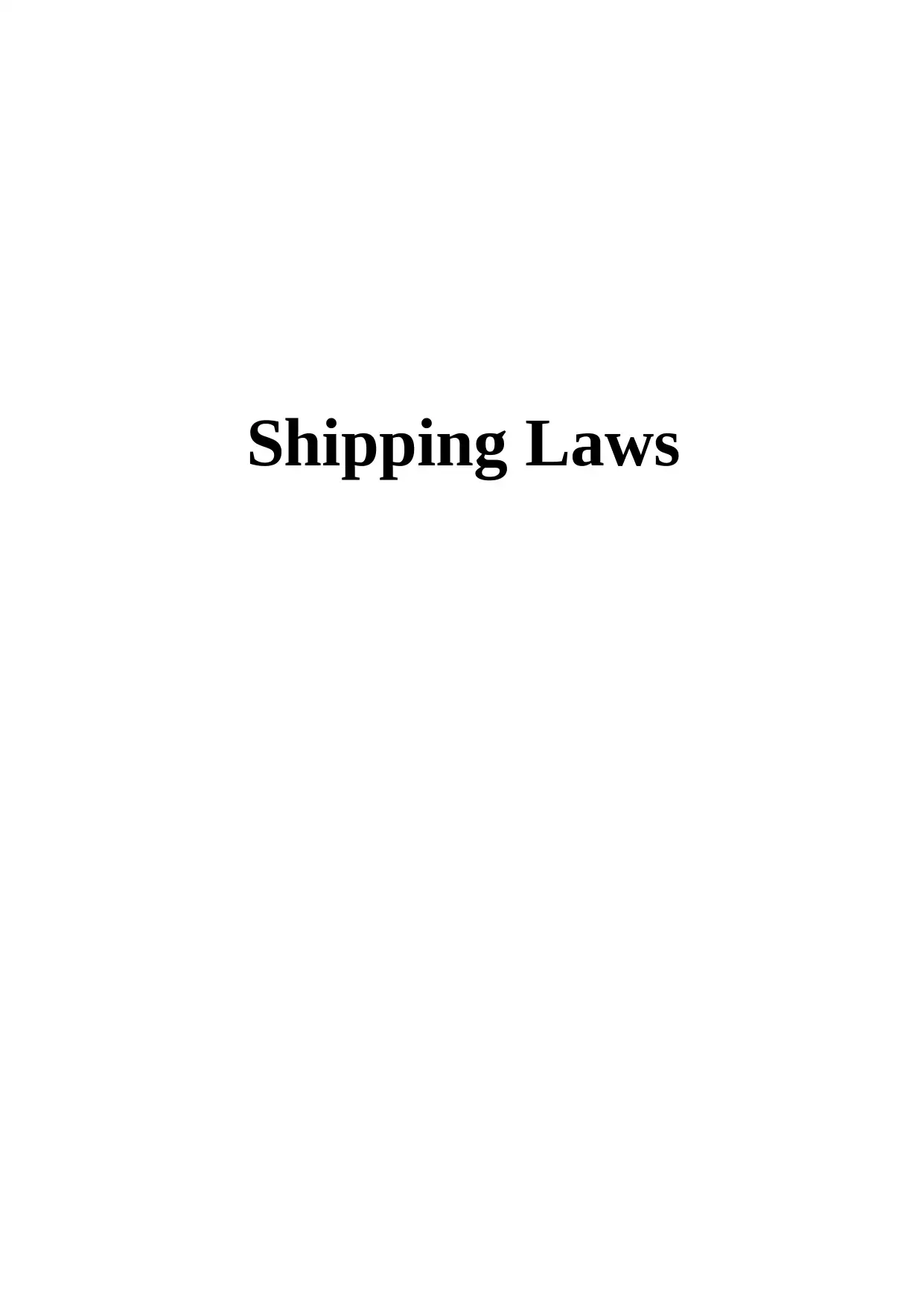
Shipping Laws
Paraphrase This Document
Need a fresh take? Get an instant paraphrase of this document with our AI Paraphraser
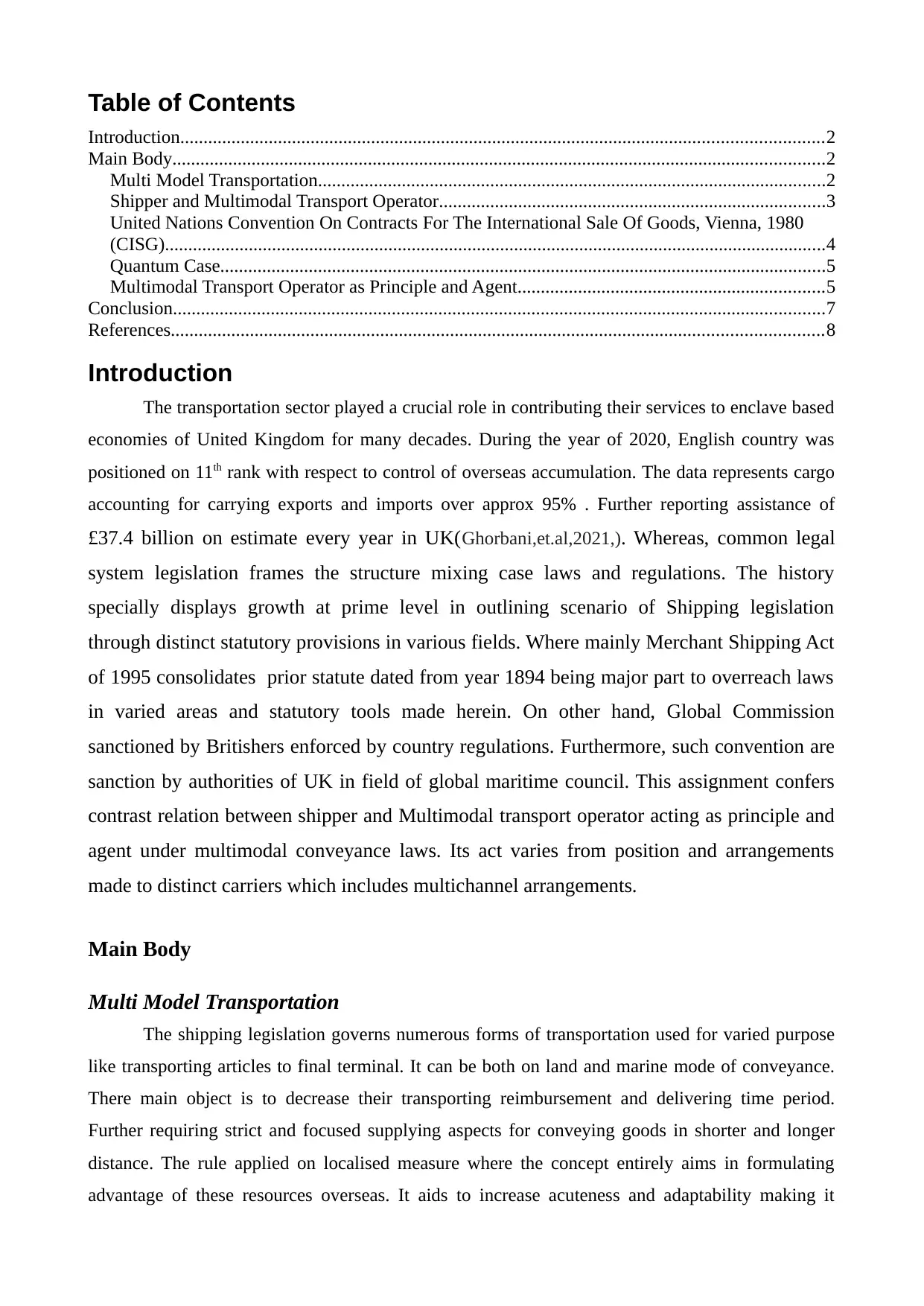
Table of Contents
Introduction..........................................................................................................................................2
Main Body............................................................................................................................................2
Multi Model Transportation.............................................................................................................2
Shipper and Multimodal Transport Operator...................................................................................3
United Nations Convention On Contracts For The International Sale Of Goods, Vienna, 1980
(CISG)..............................................................................................................................................4
Quantum Case..................................................................................................................................5
Multimodal Transport Operator as Principle and Agent..................................................................5
Conclusion............................................................................................................................................7
References............................................................................................................................................8
Introduction
The transportation sector played a crucial role in contributing their services to enclave based
economies of United Kingdom for many decades. During the year of 2020, English country was
positioned on 11th rank with respect to control of overseas accumulation. The data represents cargo
accounting for carrying exports and imports over approx 95% . Further reporting assistance of
£37.4 billion on estimate every year in UK(Ghorbani,et.al,2021,). Whereas, common legal
system legislation frames the structure mixing case laws and regulations. The history
specially displays growth at prime level in outlining scenario of Shipping legislation
through distinct statutory provisions in various fields. Where mainly Merchant Shipping Act
of 1995 consolidates prior statute dated from year 1894 being major part to overreach laws
in varied areas and statutory tools made herein. On other hand, Global Commission
sanctioned by Britishers enforced by country regulations. Furthermore, such convention are
sanction by authorities of UK in field of global maritime council. This assignment confers
contrast relation between shipper and Multimodal transport operator acting as principle and
agent under multimodal conveyance laws. Its act varies from position and arrangements
made to distinct carriers which includes multichannel arrangements.
Main Body
Multi Model Transportation
The shipping legislation governs numerous forms of transportation used for varied purpose
like transporting articles to final terminal. It can be both on land and marine mode of conveyance.
There main object is to decrease their transporting reimbursement and delivering time period.
Further requiring strict and focused supplying aspects for conveying goods in shorter and longer
distance. The rule applied on localised measure where the concept entirely aims in formulating
advantage of these resources overseas. It aids to increase acuteness and adaptability making it
Introduction..........................................................................................................................................2
Main Body............................................................................................................................................2
Multi Model Transportation.............................................................................................................2
Shipper and Multimodal Transport Operator...................................................................................3
United Nations Convention On Contracts For The International Sale Of Goods, Vienna, 1980
(CISG)..............................................................................................................................................4
Quantum Case..................................................................................................................................5
Multimodal Transport Operator as Principle and Agent..................................................................5
Conclusion............................................................................................................................................7
References............................................................................................................................................8
Introduction
The transportation sector played a crucial role in contributing their services to enclave based
economies of United Kingdom for many decades. During the year of 2020, English country was
positioned on 11th rank with respect to control of overseas accumulation. The data represents cargo
accounting for carrying exports and imports over approx 95% . Further reporting assistance of
£37.4 billion on estimate every year in UK(Ghorbani,et.al,2021,). Whereas, common legal
system legislation frames the structure mixing case laws and regulations. The history
specially displays growth at prime level in outlining scenario of Shipping legislation
through distinct statutory provisions in various fields. Where mainly Merchant Shipping Act
of 1995 consolidates prior statute dated from year 1894 being major part to overreach laws
in varied areas and statutory tools made herein. On other hand, Global Commission
sanctioned by Britishers enforced by country regulations. Furthermore, such convention are
sanction by authorities of UK in field of global maritime council. This assignment confers
contrast relation between shipper and Multimodal transport operator acting as principle and
agent under multimodal conveyance laws. Its act varies from position and arrangements
made to distinct carriers which includes multichannel arrangements.
Main Body
Multi Model Transportation
The shipping legislation governs numerous forms of transportation used for varied purpose
like transporting articles to final terminal. It can be both on land and marine mode of conveyance.
There main object is to decrease their transporting reimbursement and delivering time period.
Further requiring strict and focused supplying aspects for conveying goods in shorter and longer
distance. The rule applied on localised measure where the concept entirely aims in formulating
advantage of these resources overseas. It aids to increase acuteness and adaptability making it
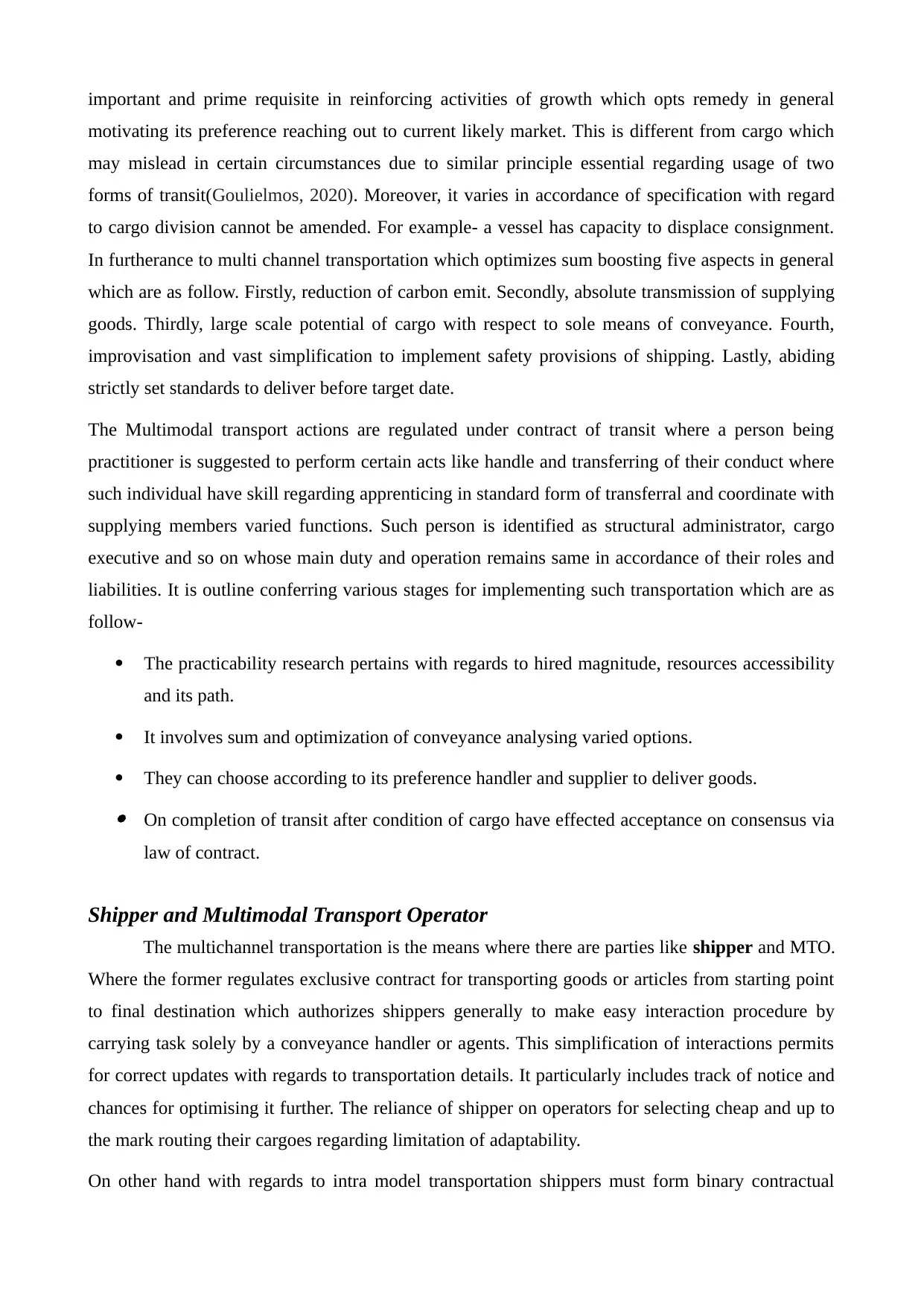
important and prime requisite in reinforcing activities of growth which opts remedy in general
motivating its preference reaching out to current likely market. This is different from cargo which
may mislead in certain circumstances due to similar principle essential regarding usage of two
forms of transit(Goulielmos, 2020). Moreover, it varies in accordance of specification with regard
to cargo division cannot be amended. For example- a vessel has capacity to displace consignment.
In furtherance to multi channel transportation which optimizes sum boosting five aspects in general
which are as follow. Firstly, reduction of carbon emit. Secondly, absolute transmission of supplying
goods. Thirdly, large scale potential of cargo with respect to sole means of conveyance. Fourth,
improvisation and vast simplification to implement safety provisions of shipping. Lastly, abiding
strictly set standards to deliver before target date.
The Multimodal transport actions are regulated under contract of transit where a person being
practitioner is suggested to perform certain acts like handle and transferring of their conduct where
such individual have skill regarding apprenticing in standard form of transferral and coordinate with
supplying members varied functions. Such person is identified as structural administrator, cargo
executive and so on whose main duty and operation remains same in accordance of their roles and
liabilities. It is outline conferring various stages for implementing such transportation which are as
follow-
The practicability research pertains with regards to hired magnitude, resources accessibility
and its path.
It involves sum and optimization of conveyance analysing varied options.
They can choose according to its preference handler and supplier to deliver goods.
On completion of transit after condition of cargo have effected acceptance on consensus via
law of contract.
Shipper and Multimodal Transport Operator
The multichannel transportation is the means where there are parties like shipper and MTO.
Where the former regulates exclusive contract for transporting goods or articles from starting point
to final destination which authorizes shippers generally to make easy interaction procedure by
carrying task solely by a conveyance handler or agents. This simplification of interactions permits
for correct updates with regards to transportation details. It particularly includes track of notice and
chances for optimising it further. The reliance of shipper on operators for selecting cheap and up to
the mark routing their cargoes regarding limitation of adaptability.
On other hand with regards to intra model transportation shippers must form binary contractual
motivating its preference reaching out to current likely market. This is different from cargo which
may mislead in certain circumstances due to similar principle essential regarding usage of two
forms of transit(Goulielmos, 2020). Moreover, it varies in accordance of specification with regard
to cargo division cannot be amended. For example- a vessel has capacity to displace consignment.
In furtherance to multi channel transportation which optimizes sum boosting five aspects in general
which are as follow. Firstly, reduction of carbon emit. Secondly, absolute transmission of supplying
goods. Thirdly, large scale potential of cargo with respect to sole means of conveyance. Fourth,
improvisation and vast simplification to implement safety provisions of shipping. Lastly, abiding
strictly set standards to deliver before target date.
The Multimodal transport actions are regulated under contract of transit where a person being
practitioner is suggested to perform certain acts like handle and transferring of their conduct where
such individual have skill regarding apprenticing in standard form of transferral and coordinate with
supplying members varied functions. Such person is identified as structural administrator, cargo
executive and so on whose main duty and operation remains same in accordance of their roles and
liabilities. It is outline conferring various stages for implementing such transportation which are as
follow-
The practicability research pertains with regards to hired magnitude, resources accessibility
and its path.
It involves sum and optimization of conveyance analysing varied options.
They can choose according to its preference handler and supplier to deliver goods.
On completion of transit after condition of cargo have effected acceptance on consensus via
law of contract.
Shipper and Multimodal Transport Operator
The multichannel transportation is the means where there are parties like shipper and MTO.
Where the former regulates exclusive contract for transporting goods or articles from starting point
to final destination which authorizes shippers generally to make easy interaction procedure by
carrying task solely by a conveyance handler or agents. This simplification of interactions permits
for correct updates with regards to transportation details. It particularly includes track of notice and
chances for optimising it further. The reliance of shipper on operators for selecting cheap and up to
the mark routing their cargoes regarding limitation of adaptability.
On other hand with regards to intra model transportation shippers must form binary contractual
⊘ This is a preview!⊘
Do you want full access?
Subscribe today to unlock all pages.

Trusted by 1+ million students worldwide
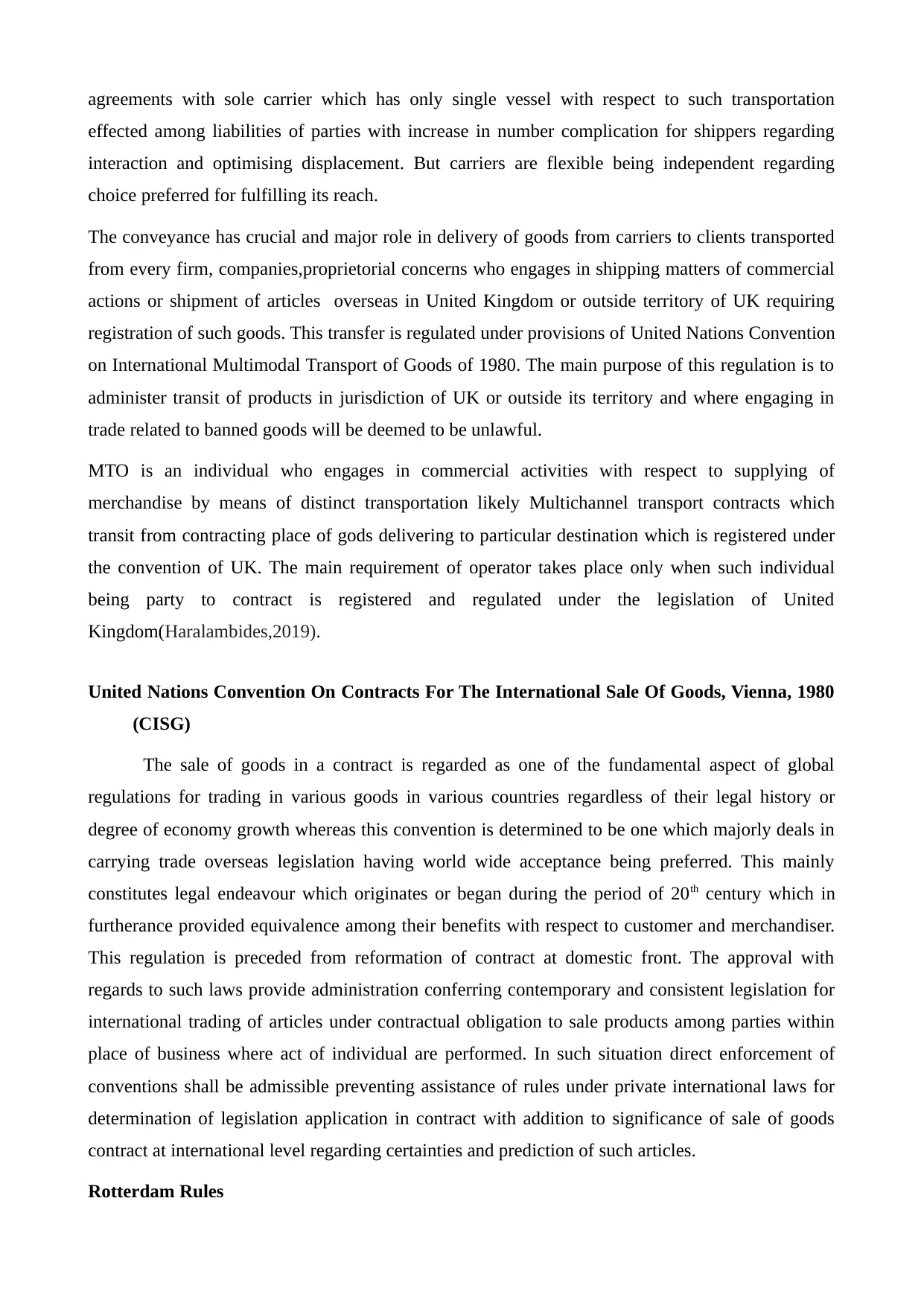
agreements with sole carrier which has only single vessel with respect to such transportation
effected among liabilities of parties with increase in number complication for shippers regarding
interaction and optimising displacement. But carriers are flexible being independent regarding
choice preferred for fulfilling its reach.
The conveyance has crucial and major role in delivery of goods from carriers to clients transported
from every firm, companies,proprietorial concerns who engages in shipping matters of commercial
actions or shipment of articles overseas in United Kingdom or outside territory of UK requiring
registration of such goods. This transfer is regulated under provisions of United Nations Convention
on International Multimodal Transport of Goods of 1980. The main purpose of this regulation is to
administer transit of products in jurisdiction of UK or outside its territory and where engaging in
trade related to banned goods will be deemed to be unlawful.
MTO is an individual who engages in commercial activities with respect to supplying of
merchandise by means of distinct transportation likely Multichannel transport contracts which
transit from contracting place of gods delivering to particular destination which is registered under
the convention of UK. The main requirement of operator takes place only when such individual
being party to contract is registered and regulated under the legislation of United
Kingdom(Haralambides,2019).
United Nations Convention On Contracts For The International Sale Of Goods, Vienna, 1980
(CISG)
The sale of goods in a contract is regarded as one of the fundamental aspect of global
regulations for trading in various goods in various countries regardless of their legal history or
degree of economy growth whereas this convention is determined to be one which majorly deals in
carrying trade overseas legislation having world wide acceptance being preferred. This mainly
constitutes legal endeavour which originates or began during the period of 20th century which in
furtherance provided equivalence among their benefits with respect to customer and merchandiser.
This regulation is preceded from reformation of contract at domestic front. The approval with
regards to such laws provide administration conferring contemporary and consistent legislation for
international trading of articles under contractual obligation to sale products among parties within
place of business where act of individual are performed. In such situation direct enforcement of
conventions shall be admissible preventing assistance of rules under private international laws for
determination of legislation application in contract with addition to significance of sale of goods
contract at international level regarding certainties and prediction of such articles.
Rotterdam Rules
effected among liabilities of parties with increase in number complication for shippers regarding
interaction and optimising displacement. But carriers are flexible being independent regarding
choice preferred for fulfilling its reach.
The conveyance has crucial and major role in delivery of goods from carriers to clients transported
from every firm, companies,proprietorial concerns who engages in shipping matters of commercial
actions or shipment of articles overseas in United Kingdom or outside territory of UK requiring
registration of such goods. This transfer is regulated under provisions of United Nations Convention
on International Multimodal Transport of Goods of 1980. The main purpose of this regulation is to
administer transit of products in jurisdiction of UK or outside its territory and where engaging in
trade related to banned goods will be deemed to be unlawful.
MTO is an individual who engages in commercial activities with respect to supplying of
merchandise by means of distinct transportation likely Multichannel transport contracts which
transit from contracting place of gods delivering to particular destination which is registered under
the convention of UK. The main requirement of operator takes place only when such individual
being party to contract is registered and regulated under the legislation of United
Kingdom(Haralambides,2019).
United Nations Convention On Contracts For The International Sale Of Goods, Vienna, 1980
(CISG)
The sale of goods in a contract is regarded as one of the fundamental aspect of global
regulations for trading in various goods in various countries regardless of their legal history or
degree of economy growth whereas this convention is determined to be one which majorly deals in
carrying trade overseas legislation having world wide acceptance being preferred. This mainly
constitutes legal endeavour which originates or began during the period of 20th century which in
furtherance provided equivalence among their benefits with respect to customer and merchandiser.
This regulation is preceded from reformation of contract at domestic front. The approval with
regards to such laws provide administration conferring contemporary and consistent legislation for
international trading of articles under contractual obligation to sale products among parties within
place of business where act of individual are performed. In such situation direct enforcement of
conventions shall be admissible preventing assistance of rules under private international laws for
determination of legislation application in contract with addition to significance of sale of goods
contract at international level regarding certainties and prediction of such articles.
Rotterdam Rules
Paraphrase This Document
Need a fresh take? Get an instant paraphrase of this document with our AI Paraphraser
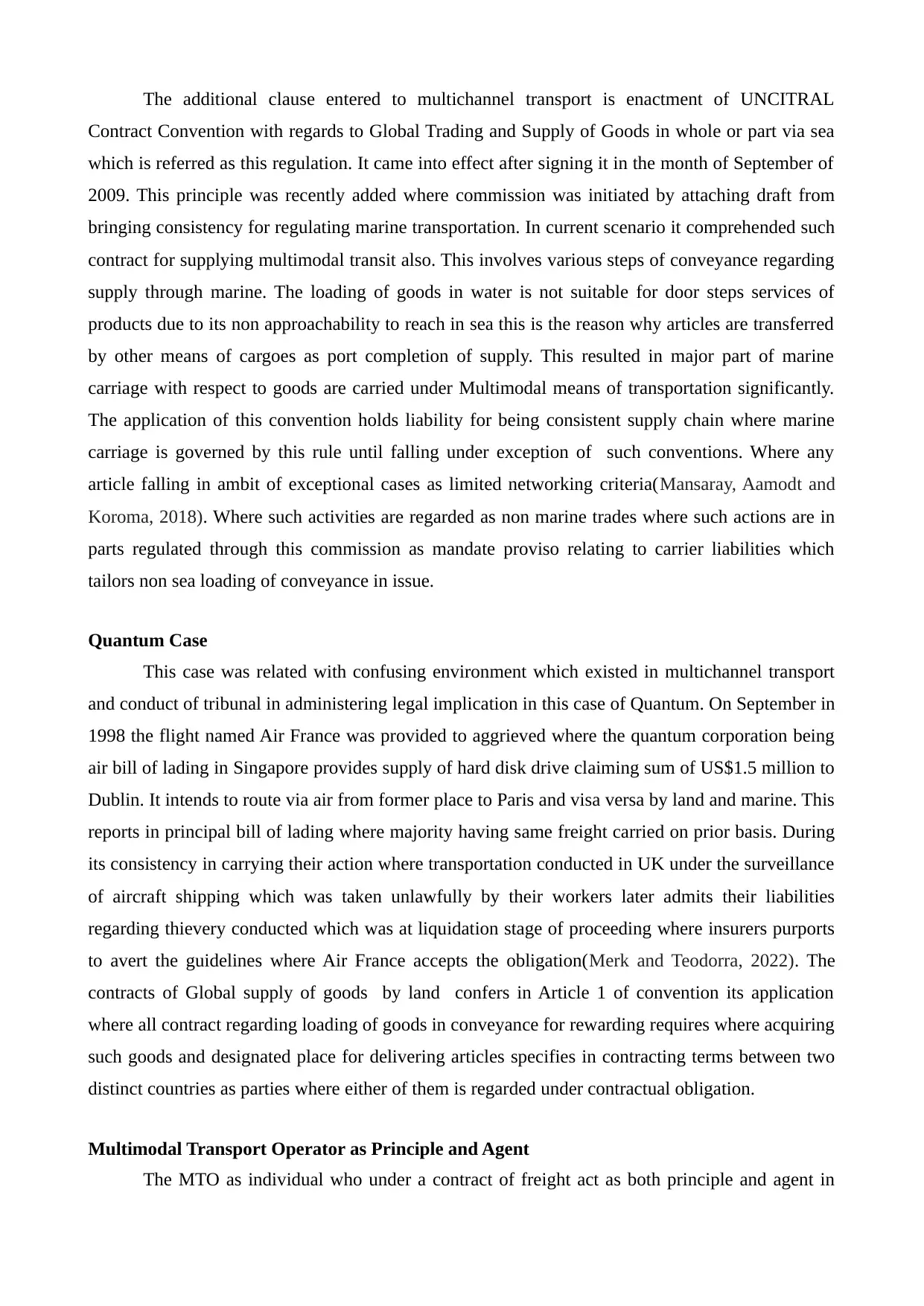
The additional clause entered to multichannel transport is enactment of UNCITRAL
Contract Convention with regards to Global Trading and Supply of Goods in whole or part via sea
which is referred as this regulation. It came into effect after signing it in the month of September of
2009. This principle was recently added where commission was initiated by attaching draft from
bringing consistency for regulating marine transportation. In current scenario it comprehended such
contract for supplying multimodal transit also. This involves various steps of conveyance regarding
supply through marine. The loading of goods in water is not suitable for door steps services of
products due to its non approachability to reach in sea this is the reason why articles are transferred
by other means of cargoes as port completion of supply. This resulted in major part of marine
carriage with respect to goods are carried under Multimodal means of transportation significantly.
The application of this convention holds liability for being consistent supply chain where marine
carriage is governed by this rule until falling under exception of such conventions. Where any
article falling in ambit of exceptional cases as limited networking criteria(Mansaray, Aamodt and
Koroma, 2018). Where such activities are regarded as non marine trades where such actions are in
parts regulated through this commission as mandate proviso relating to carrier liabilities which
tailors non sea loading of conveyance in issue.
Quantum Case
This case was related with confusing environment which existed in multichannel transport
and conduct of tribunal in administering legal implication in this case of Quantum. On September in
1998 the flight named Air France was provided to aggrieved where the quantum corporation being
air bill of lading in Singapore provides supply of hard disk drive claiming sum of US$1.5 million to
Dublin. It intends to route via air from former place to Paris and visa versa by land and marine. This
reports in principal bill of lading where majority having same freight carried on prior basis. During
its consistency in carrying their action where transportation conducted in UK under the surveillance
of aircraft shipping which was taken unlawfully by their workers later admits their liabilities
regarding thievery conducted which was at liquidation stage of proceeding where insurers purports
to avert the guidelines where Air France accepts the obligation(Merk and Teodorra, 2022). The
contracts of Global supply of goods by land confers in Article 1 of convention its application
where all contract regarding loading of goods in conveyance for rewarding requires where acquiring
such goods and designated place for delivering articles specifies in contracting terms between two
distinct countries as parties where either of them is regarded under contractual obligation.
Multimodal Transport Operator as Principle and Agent
The MTO as individual who under a contract of freight act as both principle and agent in
Contract Convention with regards to Global Trading and Supply of Goods in whole or part via sea
which is referred as this regulation. It came into effect after signing it in the month of September of
2009. This principle was recently added where commission was initiated by attaching draft from
bringing consistency for regulating marine transportation. In current scenario it comprehended such
contract for supplying multimodal transit also. This involves various steps of conveyance regarding
supply through marine. The loading of goods in water is not suitable for door steps services of
products due to its non approachability to reach in sea this is the reason why articles are transferred
by other means of cargoes as port completion of supply. This resulted in major part of marine
carriage with respect to goods are carried under Multimodal means of transportation significantly.
The application of this convention holds liability for being consistent supply chain where marine
carriage is governed by this rule until falling under exception of such conventions. Where any
article falling in ambit of exceptional cases as limited networking criteria(Mansaray, Aamodt and
Koroma, 2018). Where such activities are regarded as non marine trades where such actions are in
parts regulated through this commission as mandate proviso relating to carrier liabilities which
tailors non sea loading of conveyance in issue.
Quantum Case
This case was related with confusing environment which existed in multichannel transport
and conduct of tribunal in administering legal implication in this case of Quantum. On September in
1998 the flight named Air France was provided to aggrieved where the quantum corporation being
air bill of lading in Singapore provides supply of hard disk drive claiming sum of US$1.5 million to
Dublin. It intends to route via air from former place to Paris and visa versa by land and marine. This
reports in principal bill of lading where majority having same freight carried on prior basis. During
its consistency in carrying their action where transportation conducted in UK under the surveillance
of aircraft shipping which was taken unlawfully by their workers later admits their liabilities
regarding thievery conducted which was at liquidation stage of proceeding where insurers purports
to avert the guidelines where Air France accepts the obligation(Merk and Teodorra, 2022). The
contracts of Global supply of goods by land confers in Article 1 of convention its application
where all contract regarding loading of goods in conveyance for rewarding requires where acquiring
such goods and designated place for delivering articles specifies in contracting terms between two
distinct countries as parties where either of them is regarded under contractual obligation.
Multimodal Transport Operator as Principle and Agent
The MTO as individual who under a contract of freight act as both principle and agent in
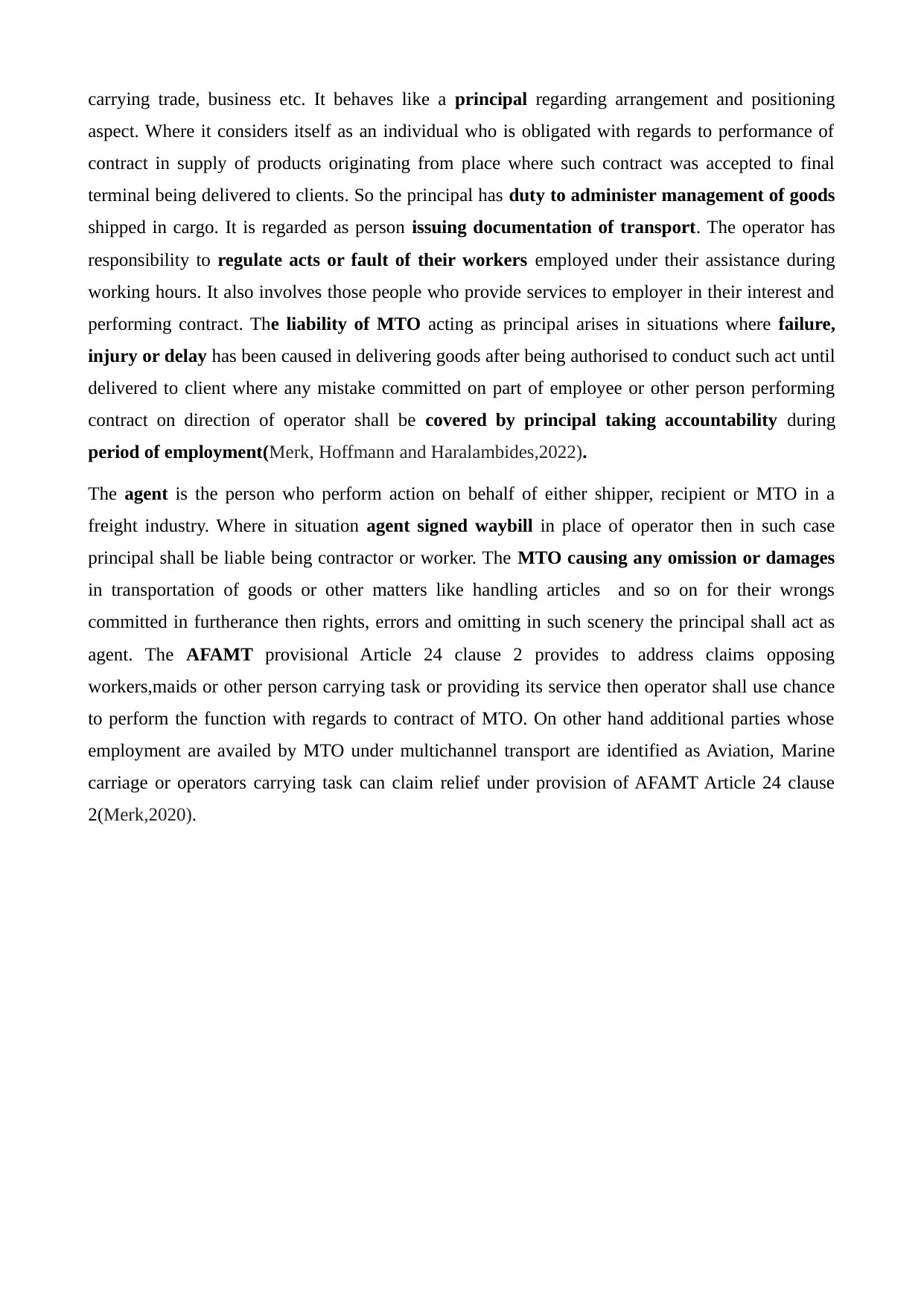
carrying trade, business etc. It behaves like a principal regarding arrangement and positioning
aspect. Where it considers itself as an individual who is obligated with regards to performance of
contract in supply of products originating from place where such contract was accepted to final
terminal being delivered to clients. So the principal has duty to administer management of goods
shipped in cargo. It is regarded as person issuing documentation of transport. The operator has
responsibility to regulate acts or fault of their workers employed under their assistance during
working hours. It also involves those people who provide services to employer in their interest and
performing contract. The liability of MTO acting as principal arises in situations where failure,
injury or delay has been caused in delivering goods after being authorised to conduct such act until
delivered to client where any mistake committed on part of employee or other person performing
contract on direction of operator shall be covered by principal taking accountability during
period of employment(Merk, Hoffmann and Haralambides,2022).
The agent is the person who perform action on behalf of either shipper, recipient or MTO in a
freight industry. Where in situation agent signed waybill in place of operator then in such case
principal shall be liable being contractor or worker. The MTO causing any omission or damages
in transportation of goods or other matters like handling articles and so on for their wrongs
committed in furtherance then rights, errors and omitting in such scenery the principal shall act as
agent. The AFAMT provisional Article 24 clause 2 provides to address claims opposing
workers,maids or other person carrying task or providing its service then operator shall use chance
to perform the function with regards to contract of MTO. On other hand additional parties whose
employment are availed by MTO under multichannel transport are identified as Aviation, Marine
carriage or operators carrying task can claim relief under provision of AFAMT Article 24 clause
2(Merk,2020).
aspect. Where it considers itself as an individual who is obligated with regards to performance of
contract in supply of products originating from place where such contract was accepted to final
terminal being delivered to clients. So the principal has duty to administer management of goods
shipped in cargo. It is regarded as person issuing documentation of transport. The operator has
responsibility to regulate acts or fault of their workers employed under their assistance during
working hours. It also involves those people who provide services to employer in their interest and
performing contract. The liability of MTO acting as principal arises in situations where failure,
injury or delay has been caused in delivering goods after being authorised to conduct such act until
delivered to client where any mistake committed on part of employee or other person performing
contract on direction of operator shall be covered by principal taking accountability during
period of employment(Merk, Hoffmann and Haralambides,2022).
The agent is the person who perform action on behalf of either shipper, recipient or MTO in a
freight industry. Where in situation agent signed waybill in place of operator then in such case
principal shall be liable being contractor or worker. The MTO causing any omission or damages
in transportation of goods or other matters like handling articles and so on for their wrongs
committed in furtherance then rights, errors and omitting in such scenery the principal shall act as
agent. The AFAMT provisional Article 24 clause 2 provides to address claims opposing
workers,maids or other person carrying task or providing its service then operator shall use chance
to perform the function with regards to contract of MTO. On other hand additional parties whose
employment are availed by MTO under multichannel transport are identified as Aviation, Marine
carriage or operators carrying task can claim relief under provision of AFAMT Article 24 clause
2(Merk,2020).
⊘ This is a preview!⊘
Do you want full access?
Subscribe today to unlock all pages.

Trusted by 1+ million students worldwide
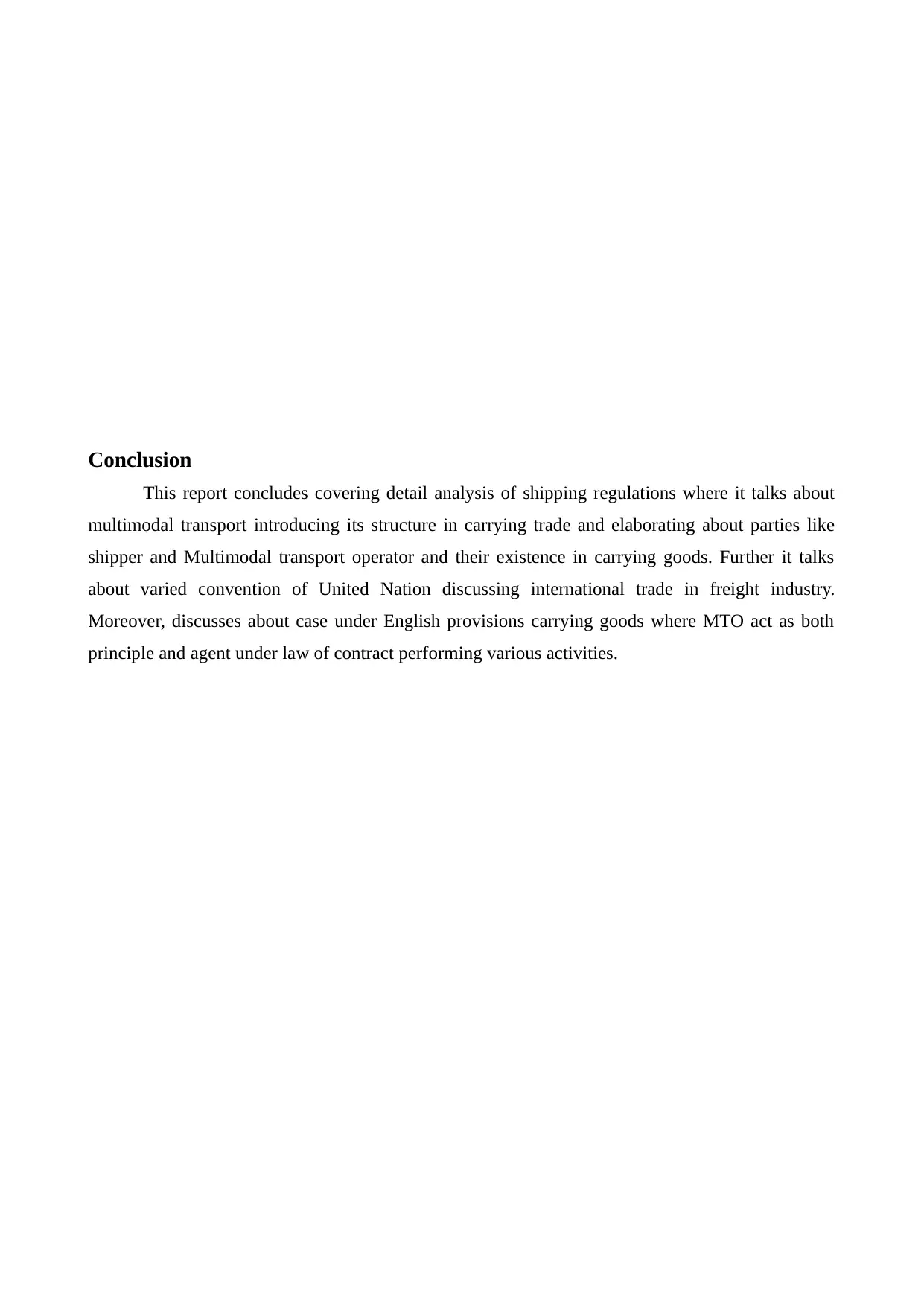
Conclusion
This report concludes covering detail analysis of shipping regulations where it talks about
multimodal transport introducing its structure in carrying trade and elaborating about parties like
shipper and Multimodal transport operator and their existence in carrying goods. Further it talks
about varied convention of United Nation discussing international trade in freight industry.
Moreover, discusses about case under English provisions carrying goods where MTO act as both
principle and agent under law of contract performing various activities.
This report concludes covering detail analysis of shipping regulations where it talks about
multimodal transport introducing its structure in carrying trade and elaborating about parties like
shipper and Multimodal transport operator and their existence in carrying goods. Further it talks
about varied convention of United Nation discussing international trade in freight industry.
Moreover, discusses about case under English provisions carrying goods where MTO act as both
principle and agent under law of contract performing various activities.
Paraphrase This Document
Need a fresh take? Get an instant paraphrase of this document with our AI Paraphraser
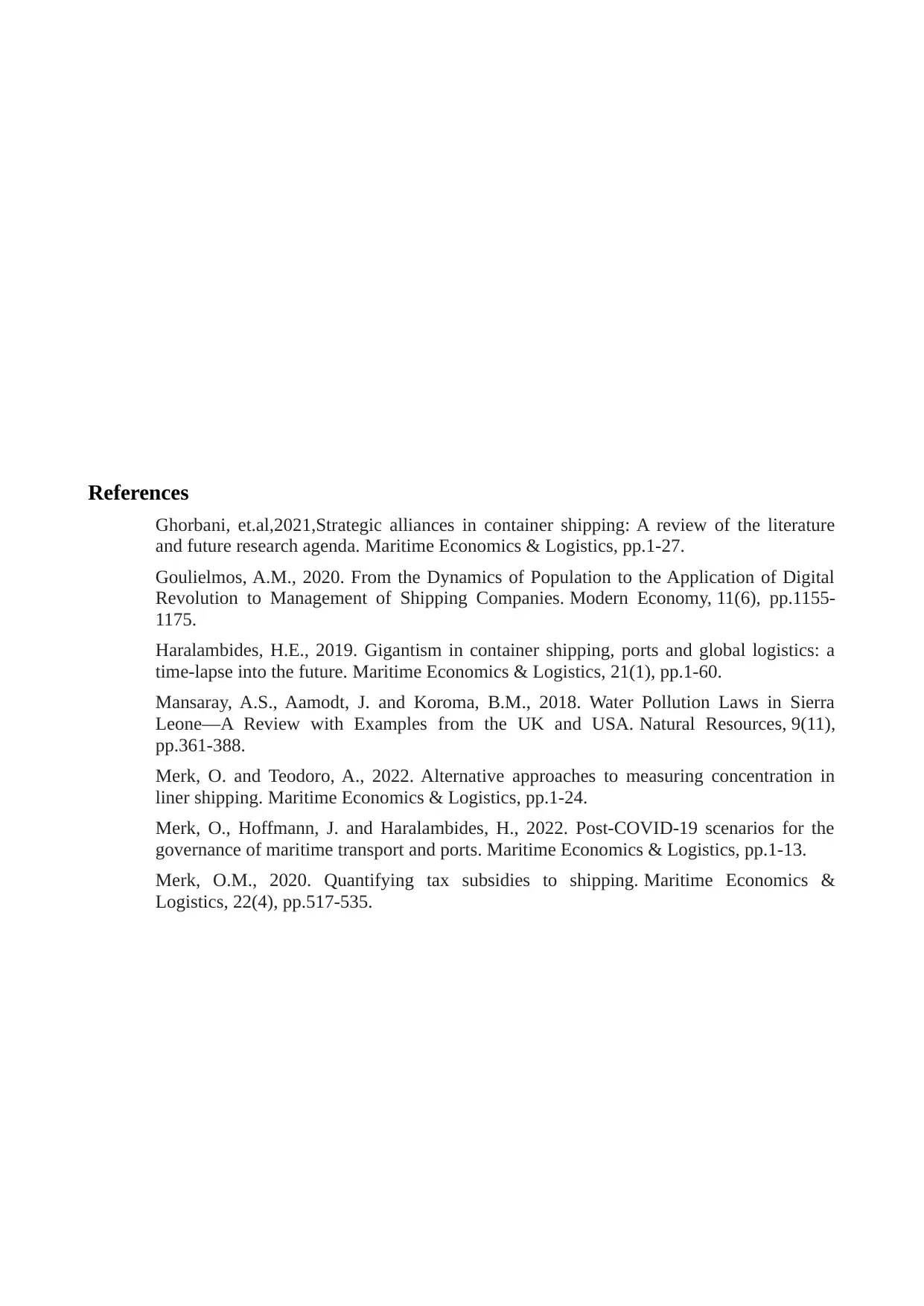
References
Ghorbani, et.al,2021,Strategic alliances in container shipping: A review of the literature
and future research agenda. Maritime Economics & Logistics, pp.1-27.
Goulielmos, A.M., 2020. From the Dynamics of Population to the Application of Digital
Revolution to Management of Shipping Companies. Modern Economy, 11(6), pp.1155-
1175.
Haralambides, H.E., 2019. Gigantism in container shipping, ports and global logistics: a
time-lapse into the future. Maritime Economics & Logistics, 21(1), pp.1-60.
Mansaray, A.S., Aamodt, J. and Koroma, B.M., 2018. Water Pollution Laws in Sierra
Leone—A Review with Examples from the UK and USA. Natural Resources, 9(11),
pp.361-388.
Merk, O. and Teodoro, A., 2022. Alternative approaches to measuring concentration in
liner shipping. Maritime Economics & Logistics, pp.1-24.
Merk, O., Hoffmann, J. and Haralambides, H., 2022. Post-COVID-19 scenarios for the
governance of maritime transport and ports. Maritime Economics & Logistics, pp.1-13.
Merk, O.M., 2020. Quantifying tax subsidies to shipping. Maritime Economics &
Logistics, 22(4), pp.517-535.
Ghorbani, et.al,2021,Strategic alliances in container shipping: A review of the literature
and future research agenda. Maritime Economics & Logistics, pp.1-27.
Goulielmos, A.M., 2020. From the Dynamics of Population to the Application of Digital
Revolution to Management of Shipping Companies. Modern Economy, 11(6), pp.1155-
1175.
Haralambides, H.E., 2019. Gigantism in container shipping, ports and global logistics: a
time-lapse into the future. Maritime Economics & Logistics, 21(1), pp.1-60.
Mansaray, A.S., Aamodt, J. and Koroma, B.M., 2018. Water Pollution Laws in Sierra
Leone—A Review with Examples from the UK and USA. Natural Resources, 9(11),
pp.361-388.
Merk, O. and Teodoro, A., 2022. Alternative approaches to measuring concentration in
liner shipping. Maritime Economics & Logistics, pp.1-24.
Merk, O., Hoffmann, J. and Haralambides, H., 2022. Post-COVID-19 scenarios for the
governance of maritime transport and ports. Maritime Economics & Logistics, pp.1-13.
Merk, O.M., 2020. Quantifying tax subsidies to shipping. Maritime Economics &
Logistics, 22(4), pp.517-535.

⊘ This is a preview!⊘
Do you want full access?
Subscribe today to unlock all pages.

Trusted by 1+ million students worldwide
1 out of 9
Your All-in-One AI-Powered Toolkit for Academic Success.
+13062052269
info@desklib.com
Available 24*7 on WhatsApp / Email
![[object Object]](/_next/static/media/star-bottom.7253800d.svg)
Unlock your academic potential
Copyright © 2020–2026 A2Z Services. All Rights Reserved. Developed and managed by ZUCOL.